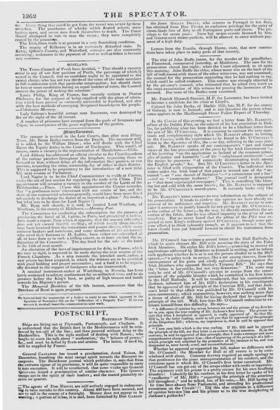Mr. O'Connell has written a second letter to the Hull
Radicals, in which he again charges Mr. Hill with inventing the story of the False Irish Members. He.styles Mr. Hill's letter —promising to answer all applications addressed by Members to himself in writing, and to inform each applicant whether he is or is not the person alluded to in the Hull speech,—"a paltry trick to escape, like a rat among cheeses, from the consequences of his gross and wholly unfounded calumny against the Irish -Members who opposed Stanley's Tyranny Bill." He says that the "letter is lawyerlike, but not very dexterous." The same may truly be said of Mr. O'Connell's attempt to escape from the conse- quences of the palpable blunder which he committed in his first letter to the Hull Radicals. It will be recollected, that his correspondent, Jackson, informed him of Mr. Hill's declaration to his constituents that he approved of the principle of the Coercion Bill; and that Jack- son's letter to that effect was published by Mr. O'Connell with his own commentary; which commentary, however, was nothing more than a tissue of abuse of Mr. Hill for having declared that be opposed the principle of the bill. Well, how does Mr. O'Connell endeavour to ex- tricate himself from this difficulty. He says— "A difference of opinion has arisen between me and the printer of my first let- - ter to you, upon the true reading of Mr. Jackson's first letter. The printer in- sists that what I deciphered as opposed, is really approved of. So that Mr. Hill is, by the latter reading, made to tell you that he approved of the principle of the Despotism Bill; whereas, my impression is, that he said he opposed that principle. "'I now care little which is the true reading. If Mr. Hill said he opposed the principle of the bill, my first letter is an answer to that assertion. If, on the contrary, he said he approved of that principle, then I make a stronger and more comprehensive charge against him—that of approving of the principle of a bill— which principle was admitted by the promoters of the measure to be, and was designated as, most harsh, cruel, and unconstitutional." Whether he opposed or supported the bill, makes no difference with Mr. O'Connell : the Member for Hull at all events is to be over- whelmed with abuse. Common decency required an ample apology to that gentleman for the gross misrepresentation of his conduct,eand the strictures:upon it which Mr. O'Connell's first letter- contained. Mr. O'Connell has not got out of the scrape either with creditor ingenuity. The argument with his printer is a pretty excuse for his own headlong blunders ! Unluckily for his-candour, in his first letter he spoke &his "recollection" of Mr. Hill's "supporting the principle of the atrocious bill throughout ;" and he talked, too, of his votes,—Mr. Hill having all • he time been-absent from Parliament, and attending 'his professional avocations on the Circuit! r! Dit this also originate in a difference of opinion'beta-eenIim and his ,prInter -as. to the true jdeciphering of Jackson'e pothooks
















 Previous page
Previous page